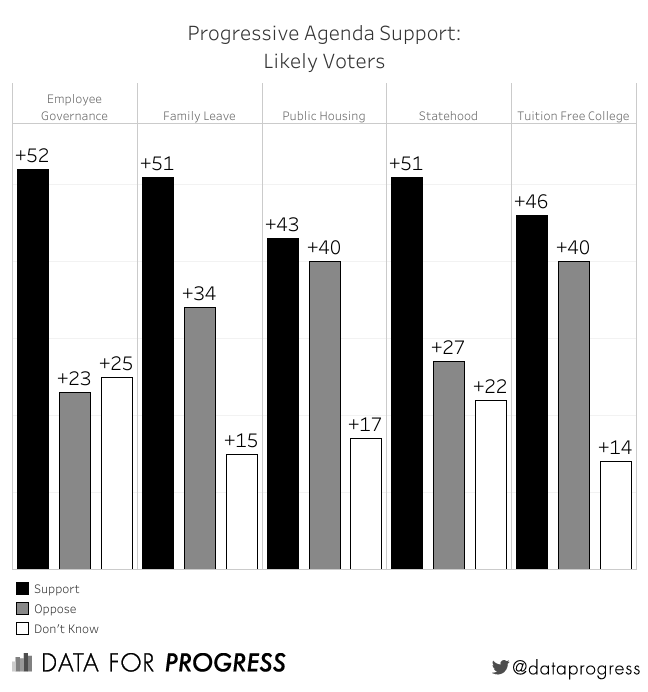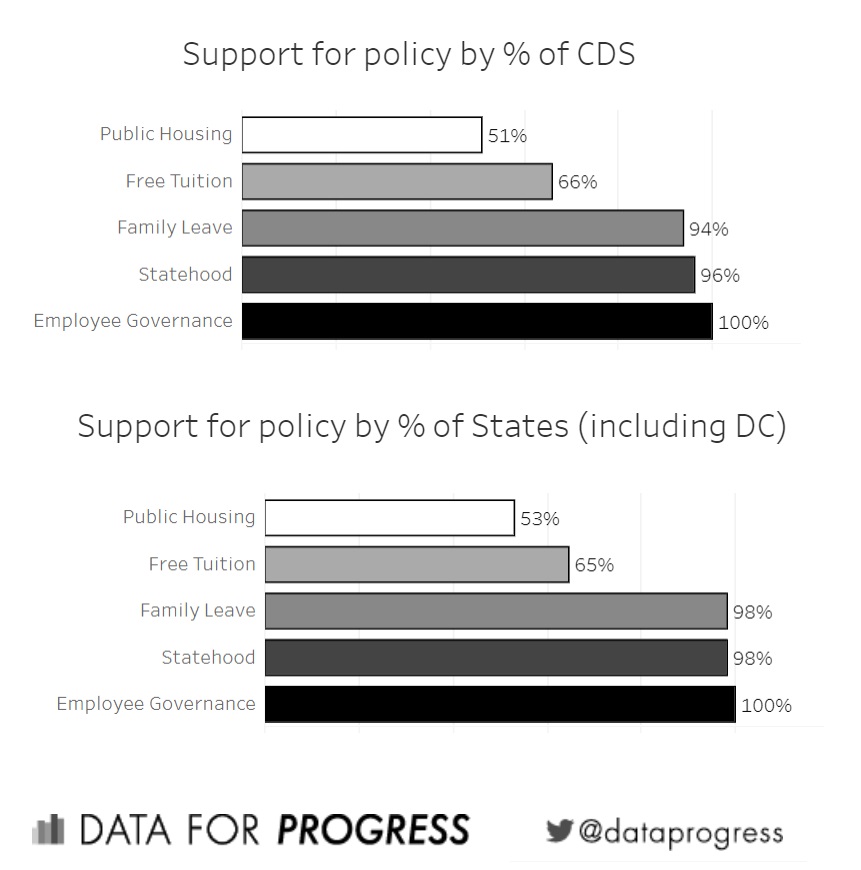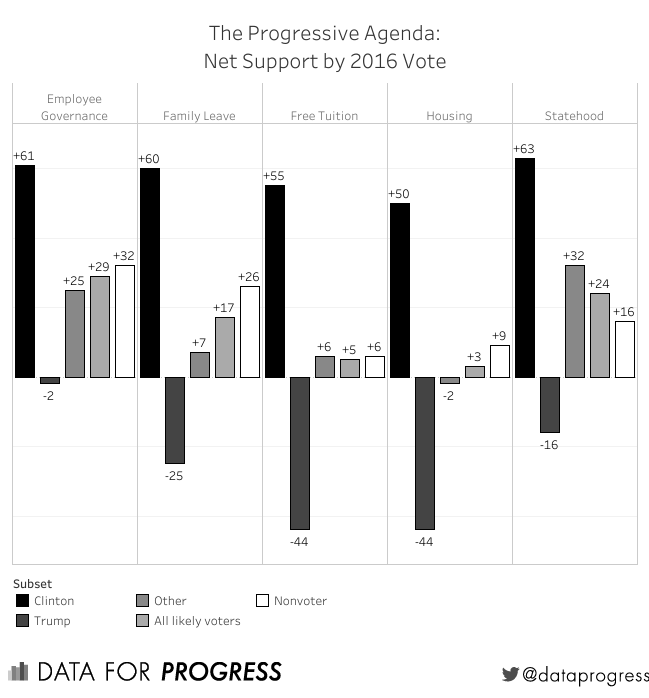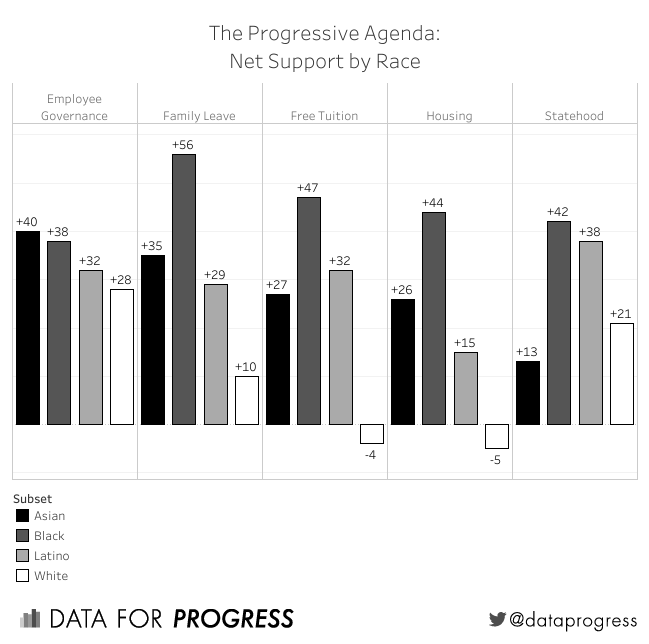Many campaigns and most incumbents do not perform regular issue polling at the state or congressional district level, meaning that they typically have to guesstimate whether a given issue will be popular among their specific electorates based on national support. Simply put, there isn't district-by-district evidence regarding the electoral viability of the progressive agenda. Until now.
For our New Progressive Agenda Project, Data for Progress (@DataProgress) enlisted Civis Analytics (@CivisAnalytics), a leading data science firm, to poll a dozen progressive policies. Our goal is to give policymakers the most reliable numbers to date on support for a new and vibrant progressive agenda. For each policy, we asked a leading politician or expert to explain why it’s necessary. But in addition, we tested it with the public. These policies have durable support and can stand up to predictable right-wing counterarguments. We have good reason to believe that even when they become politicized, they’ll remain popular with persuadable voters and the base in many geographies.
The New Progressive Agenda Project gives policymakers and advocates reliable congressional district and state-level polling data that would normally be out of reach for even the best-funded campaign. In the coming weeks, we’ll be periodically releasing new data on progressive proposals that are message-tested and ready to be introduced in the 116th Congress. Using the state-of-the-art modeling techniques employed by leading campaign professionals, we are confident that these policies will remain popular in the electorate at large while also engaging the progressive base. They have been carefully vetted by veteran campaigners from Civis Analytics, which was formed by the data scientists who oversaw Barack Obama’s 2012 re-election campaign. Civis’s political data science arm is one of the most reputable in the business. These numbers are the gold standard -- they are actionable by candidates and campaigns.
It’s time for unabashed progressive policies that can win.
Today, we roll out our first set of policies:
Senator Kirsten Gillibrand (@SenGillibrand) makes the case for family leave
Senator Tammy Baldwin (@SenatorBaldwin) makes the case for employee governance (also known as worker co-determination)
Senator Cory Booker (@CoryBooker) makes the case for a federal investment in fair housing
State Senate candidate Zellnor Myrie (@zellnor) looks at public housing from a state perspective
State Senator Kevin de León (@kdeleon) makes the case for free college
Political scientist David Faris (@davidmfaris) makes the case for DC, Puerto Rico and territory statehood
Methodology:
Civis Analytics fielded support for five progressive policies to determine public support for the policies. Full question wording is available below, but here it is important to note that questions included a revenue pay-for where needed, as well as both partisan cues and counterframes throughout. In other words, respondents were told that these policies were being proposed by Democrats, and were given reasons why Republicans say they should oppose them. The average sample for analysis was 5,925 and these surveys were fielded between February 15th, 2018 and August 2nd, 2018. Using using modern machine learning techniques, Civis generated estimates for Clinton voters, Trump voters, Independent voters, drop-off voters (who voted in 2016 but not 2014) and the overall electorate. Because our goal is to provide information that can be immediately relevant to politicians, the overall number reflects a likely 2018 electorate, not national adults. Policies are presented in terms of their two-way support (that is, excluding respondents who did not register an opinion one way or the other).
For our first round of polling, we analyzed five policies:
Federal investment in housing: we asked respondents whether they would support a large scale investment in public housing. Forty-three percent of likely 2018 voters in support, 40 percent opposed.
Employee governance: we asked respondents if they would support establishing worker representation on companies’ board of directors (also known as “worker co-determination"). Fifty-two percent of likely 2018 voters in support, 23 percent opposed.
Family leave: we asked respondents if they would support paid leave for medical issues or a childbirth. Fifty-one percent of likely 2018 voters in support, 34 percent opposed.
Statehood: we asked respondents if they would support allowing DC, Puerto Rico and the US Virgin Islands to hold a binding referendum for statehood. Fifty-one percent of likely 2018 voters in support, 34 percent opposed.
Free tuition: we asked respondents if they would support a policy granting free tuition to all students. Forty-six percent of likely 2018 voters in support, 40 percent opposed.
The candidates quoted here do not necessarily endorse the policies they do not directly speak to, nor is Civis Analytics endorsing the politicians and ideas presented here.

What We Found:
All of these policies carry net support with likely 2018 voters nationally, though the level of that support varies by policy across different geographic areas. We find that in many cases, these policies can help progressives both win over independents and mobilize drop-off voters. In some cases, these policies are even quite popular with Trump voters.
All of these policies have net positive support among likely 2018 voters in a majority of states and congressional districts. Employee governance, family leave and statehood for DC and territories have net positive support in more than 90 percent of states and congressional districts.
It’s time for progressives to leave their defensive crouch. An increasing amount of polling shows that progressive policies are popular and could help reshape American politics.

You can analyze congressional district and state level opinion below - desktop only (scroll to the bottom of the page for tables).


Family Leave
The political case for family leave, from Data for Progress (@DataProgress)
Paid family leave has net support among likely 2018 voters in every state (plus DC) except for Wyoming. Among Independent voters, it has net support in every state (from DC to Wyoming), and among drop-off voters, there is net support in 48 states (again, including DC).
The policy has net support in 408 congressional districts among likely 2018 voters. It has net support in 435 among independents and in 390 congressional districts among drop-off voters.
This policy carries net support across all age, race, education, gender, and income groups, although in some cases there are stark divides in the margins of this net support. For instance, paid family leave carries net +37 support among likely 2018 voters under the age of 35, while is barely above water among likely 2018 voters over the age of 65 (+2 net support). Additionally, the policy is at +56 among black likely voters while being only +10 among white likely voters. As Democrats look to expand their lead with women, family leave (+24 among women) stands out as a strong policy to run on without alienating men (+10). It is also worth noting that the income group with the strongest net support for paid family leave is the lowest one, with respondents with family incomes of under $25,000 per year supporting the policy at net +26.
Our question wording for this proposal includes an explicit pay-for in the form of a modest payroll tax increase, as well as a Republican counterargument that the policy would effectively increase taxes to pay for white-collar workers’ time off.
The policy case for family leave, from Senator Kirsten Gillibrand (@SenGillibrand)
At some point, every one of us is going to have a situation where we need some time to take care of our families. It might be a medical emergency – maybe your spouse is diagnosed with cancer – or maybe you suddenly need to care for an aging parent who has Alzheimer’s, or maybe you’re starting a new family and just had a baby. Whatever the case, no working American should ever have to choose between their family and their paycheck – but if you don’t have paid family and medical leave, like 85 percent of workers, then that’s exactly the choice you have to make. This is especially true if you are working a low-wage job. Congress desperately needs to catch up, and that’s why I introduced a bill called the FAMILY Act, which would finally create a national paid leave program for our country.
Here’s what the FAMILY Act would do: It would cover all workers, including part-time and self-employed, for any life event that you or your family might face. It’s an earned benefit, so it would stay with you wherever you live and wherever you work. It would cover two-thirds of your paycheck for up to three months. And it would only cost you and your employer about two dollars per week – basically the cost of a cup of coffee – in exchange for the security that you can be there for your family when they need you.
The FAMILY Act would help businesses, too. California has had a statewide paid leave program for more than a decade, and in a survey, 90 percent of business owners there said that paid leave had a positive or, at worst, no negative effect, on their profits, their productivity, or their retention, and 99 percent of them said it boosted employee morale. Not only that, but the FAMILY Act would level the playing field so that small businesses can offer paid leave to their workers and compete with the Googles and Facebooks of the world. Many states, including my home state of New York, already have or will soon implement their own paid family and medical leave policies, but that’s not enough. We’re still the only industrialized country that doesn’t guarantee any form of paid leave to all workers. So let’s change that. Let’s pass the FAMILY Act.
- Senator Kirsten Gillibrand (@SenGillibrand)
Employee Governance
The political case for employee governance, from Data for Progress (@DataProgress):
Putting workers on the board of directors (known as “worker-co-determination") has net support among Independents, drop-off voters and likely 2018 voters overall in every geographic area we examined. It is above water in every state in the country, including DC, as well as every congressional district. In many areas, it has net positive support among Trump voters.
The policy has net support among white (+28), black (+38), Latino (+32) and Asian-American (+40) likely voters, as well as among college (+31) and non-college voters (+28). There is no demographic we examined where support is lower than opposition.
Our question wording for this policy included Republican counter-arguments that the policy would make companies less efficient and hurt the economy.
The policy case for employee governance, from Senator Tammy Baldwin (@tammybaldwin)
In Wisconsin, and in manufacturing states across America, it’s workers are who driving our economy forward. Wisconsin workers not only make ship engines, iron pipes and paper — they create value and generate big profits. Yet, too many workers are seeing their company boards make short term decisions that take these worker-created profits and put them into increasing CEO pay and rewarding wealthy Wall Street investors, instead of raising wages and reversing pension cuts.
We’ve seen this repeatedly following the new Republican tax law. Big corporations are pocketing a massive, permanent tax break by rewarding the wealth of their top executives and Wall Street investors with even more stock buybacks, all while closing profitable factories and laying off workers in Wisconsin and across the country. This surge in corporate buybacks is fueling greater wealth inequality and wage stagnation, and is the result of workers being shut out of the decision-making process at their own companies.
Giving workers a seat at the table will not only rein in corporate America’s addiction to stock buybacks, it’ll give workers the voice and power they need to help write the rules of our economy, and it'll help companies grow by making sure leadership is in touch with what is happening on the ground. The Reward Work Act would allow workers to help decide how their company’s profits are spent by requiring that one-third of the board of directors be directly elected by rank-and-file employees. Advanced manufacturing economies across the world guarantee workers a voice on the board when it comes to company decisions. American workers should also have that opportunity too, so they can advocate for a fairer economy that leads to shared prosperity for working families — not just more wealth for the already wealthy.
-Senator Tammy Baldwin (@tammybaldwin)
Free College
The political case for free college, from Data for Progress (@DataProgress):
Providing free college tuition for all students has net support among likely 2018 voters in 33 states (including DC). It also has net support among independent voters in 42 states, and among drop-off voters in 32 states. The proposal has net support among likely 2018 voters in 288 congressional districts, or 66% of House constituencies. Fifty-four percent of likely voters who registered an opinion support this proposal in the median congressional district, and 53% of such voters support it in the median state.
Free tuition is somewhat polarizing by race, age, and income. The policy enjoys net support among likely voters under the age of 35 (+26), black likely voters (+47), and likely voters with household incomes under $25,000 (+15). However, it is opposed on net by likely 2018 voters over the age of 65 (-14), white likely voters (-4), and likely voters with household incomes over $150,000 (-6).
This proposal was paired with pay-for language specifying a tax increase on families making over $200,000 per year, and a Republican counterargument that this policy would amount to unnecessary aid to well-off families at taxpayers’ expense. As Democrats look for policies that can energize young people, tuition-free college stands out.
The policy case for free college, from State Senator Kevin de León (@kdeleon)
Our country doesn’t charge tuition or fees for public K-12 education because we intuitively understand that every child deserves a fair shot at success. But a high school diploma is no longer enough to guarantee economic security for our children or our country. By the year 2030, 38% of jobs in California alone will require a bachelor’s degree, graduate degree, or a doctorate. We’ve got to fill those jobs, and to do that we’ve got to make sure the next generation of Americans can go to college tuition-free.
Free public college is no pipe dream – in fact, it used to be the status quo in California. But state funding cuts for education, combined with public outcry against tuition increases, has resulted in a precarious reliance on financial aid. Under today’s current high-price, high-aid model, the average student enters the job market owing $30,000. This isn’t working for our graduates, or for our economy.
Promoting affordable plans for community college, vocational schooling, and higher education will help us achieve the best-educated workforce in the world and ensure that all of our future leaders are given equal opportunities to succeed. A smarter, more skilled workforce, with less debt and more spending money, will spur the innovation that sets our economy apart and keep us competitive worldwide.
- State Senator Kevin de León (@kdeleon)
Housing
The political case for public housing, from Data for Progress (@DataProgress):
Taxing families that make over $200,000 per year to fund a large-scale expansion in public housing has net support among likely 2018 voters in 27 states (including DC). The proposal has net support among independents in 28 states support the proposal, and a majority of drop-off voters in 22 states support it. The policy also carries net support among likely voters in 222 congressional districts, or just over half of all districts in the country. The median district and state both see two-way support among likely 2018 voters at just over 50%.
Unlike many of the other issues we have polled, public housing does divide some demographic groups in terms of net support versus opposition. The policy enjoys net +22 support among likely 2018 voters under the age of 35, but is net -7 among likely 2018 voters over the age of 65. It is +22 among likely 2018 voters with family incomes under $25,000, but is -12 among likely 2018 voters with family incomes over $150,000. Finally, it is +44 among likely black voters and +15 among likely Latinx voters, but is -5 among likely white voters. Finally, the policy is net +10 among women who are likely to vote in 2018 and -6 among their male counterparts.
Our question wording for this policy noted that Republicans object to the proposal on the grounds that it will lead to more crime and the benefits would be concentrated in cities, and specified that the policy would be paid for by a three percent income tax on high earners. In districts and states that would benefit enormously, like California (61% two-way support) and New York (59%) the policy has strong support among likely voters.
The policy case for federal intervention in housing, from Senator Cory Booker (@CoryBooker):
Make no mistake about it, there is a very real housing crisis in this country and millions of Americans can’t afford a roof over their heads. Decades of unfair federal housing policy and exclusionary local zoning practices have created stark economic and racial segregation that have deep implications for educational opportunity, economic mobility, and health outcomes. I saw this first-hand at the beginning of my career as a tenants’ rights lawyer – it was very clear how patently unfair the housing market was and how hard families had to fight to remain in substandard, low quality housing because they simply had no other options. We must do better. The HOME Act is a first step in beginning to tackle the systemic challenges that exist with housing supply and affordability.”
- Senator Cory Booker (@CoryBooker)
Read more about Senator Booker’s HOME Act.
The policy case for public housing, from New York State Senate candidate Zellnor Myrie (@zellnor):
Housing is a human right - but our country hasn’t been treating it like one. More than half a million Americans are homeless, and millions more make extreme sacrifices to keep a roof over their heads. There isn’t a single city or county where a minimum-wage worker can afford to rent a two-bedroom by working a 40-hour week.
In rapidly gentrifying areas like Brooklyn, we see stark examples of how the private housing market can fail communities, by forcing working-class people to write rent checks they can’t afford and pushing families out of their own neighborhoods. But skyrocketing rents and displacement of long-term residents are not inevitable. They are results of chronic underinvestment in public housing.
New development has been concentrated around high-cost rentals, and many existing public developments have fallen into disrepair. In addition to rent stabilization policies at the city and state levels, we need massive federal investment in building and repairing housing that low-income people can afford. Doing so would help close the racial wealth gap, improve financial security, and revitalize communities across the country.
- New York State Senate candidate Zellnor Myrie (@zellnor)
DC, Puerto Rico and Territory Statehood
Data for Progress (@DataProgress) Analysis:
Admitting DC and current US territories into the Union if they vote to become states has net support among likely 2018 voters in every current US state except Wyoming, where support is only 49% among those who registered an opinion. The proposal has net support among independent voters in every state, and has net support among drop-off voters in every state except Wyoming (again, support among those who recorded an opinion is 49%). The highest level of overall support is observed in DC itself, where 89% of likely voters with an opinion are in favor -- followed by Hawaii and Vermont at 74% and 73%, respectively. Similarly, in only 17 congressional districts (about three percent of the House) does opt-in statehood not enjoy net support among likely 2018 voters.
For both states and congressional districts, the median level of support for this proposal was 63% -- even though respondents were explicitly told that this would likely give Democrats more political power, a probable (and likely correct) Republican counterargument to the proposal.
Allowing DC and current US territories to opt in for statehood has net support across all age, race, education, gender, and income groups. It is particularly popular among people of color, college educated voters, and young voters with net support of +42 among black likely voters, +38 among Latinx likely voters, and +35 among college-educated likely voters, and +31 among likely voters under the age of 35.
Our question wording for this item reminded respondents that, if implemented, this policy would represent a significant electoral advantage for the Democratic Party.
The policy case for DC and territorial statehood, from political scientist David Faris (@davidmfaris):
Since the 2016 election, progressives seem to be paying more attention to the structural biases in American political and electoral institutions. Nowhere is this more obvious than in the Senate, where the power of people of color and young people are diluted by an institution originally designed to place a check on popular sovereignty. Equal representation in the world’s most malapportioned legislative body is written into the Constitution, and distorts Electoral College math such that a minority of the popular vote has put a Republican in White House in two of the last five presidential elections.
One obvious solution is to add new states as a counterbalance, offsetting the states that currently distort the correspondence between our votes and our electoral outcomes. Thankfully, this partisan logic also lines up neatly with the moral imperative of enfranchising millions of people who live under American dominion but lack the slightest input in our national politics. Creating new states is not terribly complicated, because Congress can follow more or less whatever rules it likes to add additional states to the union. The Constitutional language is brief and unambiguous. As far as bestowing statehood on places like the District of Columbia and Puerto Rico, Congress doesn’t technically even need the permission of the people who live there, although of course our expectations of democracy now justifiably demand it in the form of referendums. Thankfully, strong majorities in both places have already asked for statehood, and should be granted it forthwith.
If DC and Puerto Rico were already states, DC wouldn’t have its policy preferences blocked by Congress and Puerto Rico would have fared far better during the aftermath of Hurricane Maria. But why stop with DC and Puerto Rico? Why not the Virgin Islands? Why not Guam? All of these territories suffer injustice from being ruled by the United States without having any voting representation in Congress. Some common objections will melt away under the slightest scrutiny. Aren’t the Virgin Islands, with some 106,000 people, too sparsely inhabited? Not at all. The Constitution includes no language about the population requirements of new states, which already vary wildly from micro-states like Wyoming (579,315) to quasi-countries like California (38 million). The difference in population between Guam and Wyoming is nothing compared to that between Texas and Alaska. Wouldn’t it be difficult to administer such far-flung territories from Washington? Maybe! But we already do. You soon get down to absurd protestations, like the financial difficulty of producing millions of new flags. Friends, Republicans just trash-fired $12 billion covering up the political costs of the president’s impetuous trade wars. We can afford new flags.
Pundits and centrists might worry that pursuing statehood for these territories would be perceived as a transparent power play. But, the norm-based order that Senate traditionalists once thrived on is long dead, and continuing to yearn for it is a terribly sad waste of time and energy. A better path for Republicans would be, instead of complaining about how these territories would lean Democratic, to ask themselves why American’s racial and ethnic minorities increasingly despise and fear the GOP, or to ask themselves why they think it is ok to exercise sovereignty over people indefinitely without granting them true representation in our national government. If the contemporary Republican Party hadn’t been conquered by misfit Nazis and open racists, and if the current Republican administration hadn't turned its disaster relief into an incompetent grift operation, they could be competitive for Puerto Rico’s two senate seats, as they would have been just 15 or 20 years ago. It is therefore long past time for Democrats to use a radical enlargement of the union to benefit not just themselves, but also the long-suffering citizens of these territories.
Analyze the data in table form:
Question Wording
Public housing
Some Democrats in Congress are proposing large scale investment in public housing. This would be paid for by a 3 percent income tax increase on those making over 200,000 dollars per year. Democrats say everyone should be able to afford a decent place to live for their family and the wealthy should pay their fair share. Republicans say this would just lead to more crime, and benefits would be concentrated in cities. Do you support or oppose this policy of public housing construction?
Employee governance
In many countries, employees at large companies elect representatives to their firm's board of directors in order to advocate their interests and point of view to management. Democrats say this gives regular workers a greater say over how their companies are run and will increase wages, while Republicans claim that this makes companies less efficient and would be bad for the economy. Would you support or oppose mandating that large companies allow employees to elect representatives to their board of directors?
Family leave
Some Democrats in Congress are proposing a program that would provide paid leave (up to 66 percent of pay) to employees taking up to 12 weeks off for serious medical issues or childbirth. This would be paid for by a 0.2 percent payroll tax increase on employees and employers.
Democrats say that every worker in America has the right to take leave for childbirth or medical emergencies, and this program makes paid leave affordable for employers of all sizes and for workers and their families. Republicans say that this represents a tax hike on American workers, and we shouldn't be paying for lawyers and executives to take leave by taxing the average American. Do you support or oppose this policy of paid leave?
DC/PR/Territory statehood
Some Democrats in Congress are proposing a bill to allow any territory or capital district, like Puerto Rico Or the US Virgin Islands, containing at least 100,000 people to hold a referendum and apply for statehood. If a majority vote for statehood, the territory would become a state.
Democrats say that the nearly five million American citizens who live in American territories have the right to choose if they want to be represented in congress, while Republicans say that this is a nakedly partisan attempt by Democrats to create more Democratic-leaning seats out of territories which are too small to become states. Would you support allowing territories to petition congress to become states?
Tuition-free college
Some Democrats in Congress are proposing a law which would cover college tuition for all students, while capping the rise in tuition at the rate of inflation for all colleges accepting such funding. This would be paid for by an income tax increase of 5 percent on those making over 200,000 dollars per year.
Democrats say this will allow every family in American to afford a quality education for their children. Republicans say it isn’t the responsibility of the taxpayers to foot the bill for college students from well to do families. Do you support or oppose this proposal?
Note: An earlier version of the cross-tabulation analysis included housing support that did not include leaners. It does not affect our analysis.

